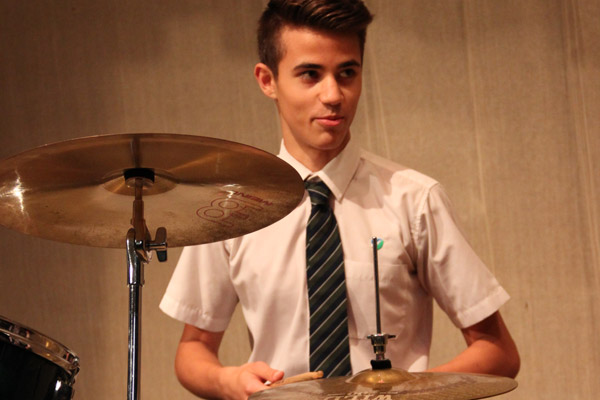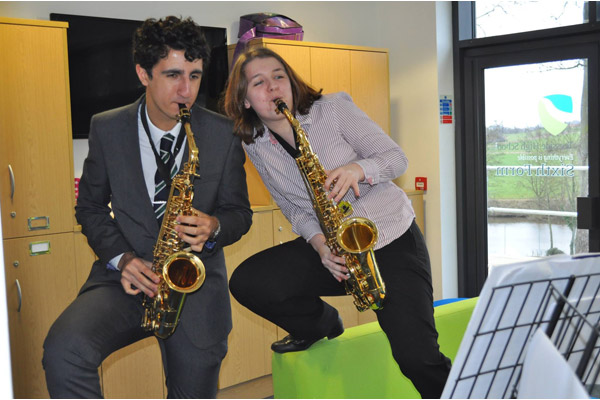“The English may not like music, but they absolutely love the noise it makes” – Sir Thomas Beecham
We are very proud of our musicians. Almost a third of the school population learn to play a musical instrument and pupils of all ages are progressing from beginner through beyond Grade 8. We have many pupils who perform with county groups and in some cases, national ensembles. What is most rewarding is the way in which our pupils support each other. Our experienced visiting staff help to nurture and encourage our younger pupils and they are the reason that Teesside High School Music Department is the success that it is.
KS3
Music is all around us. Every day we can hear music on the television and radio, when we go to the cinema, when we go shopping. Even in lifts and when we are on ‘hold’ on the telephone, music is part of our everyday lives – try to imagine a world without music!
In music as a classroom subject, students explore three main activities which remain consistent throughout – Listening, Performing and Composing. These areas help students to understand how music ‘functions’ within different styles and genres of music, and start to understand why they like some styles of music and not others.
They will learn how to describe music using appropriate musical language, how to perform music as an individual and as part of a group, and how to create music through composing using both traditional instruments and our state of the art music technology facilities.
The course covers a vast range of musical styles and forms – Popular Music from The Beatles to Ed Sheeran, Minimalism, Music for Film, Songs from Musicals, Jazz and Blues, Classical and Romantic, Indian, African and Chinese music. Not only will students learn about the vast range of instruments used to perform these styles of music, but also they will understand how important the role of music is within all cultures throughout the world.
Students do not have to play a musical instrument to a high standard to do well in music, but it is a demanding subject and requires a lot of effort and energy! It will be very rewarding if they put their heart into it.
GCSE MUSIC (EDEXCEL 2MU01)
During the course students will learn about and listen to a rich and diverse selection of musical styles and genres from all corners of the Earth – some will inspire, some will surprise, some will certainly not be to everyone’s taste, but it will give them a fascinating insight into the world of music and how much it means to people from all walks of life. At GCSE students study a range of set works from The Western Classical Tradition, Music in the Twentieth Century, Popular Music in Context and World Music.
They will also perform on their chosen instrument/voice during the course in addition to creating a portfolio of musical compositions.
AS/A2 MUSIC (AQA)
If students are passionate about Music, this A Level course will give them two years of bliss. Of course there’s study and hard work … but if they love music the time will fly by. And along the way they will give their own musical ability wings. Music is a synthesis of logic and imagination. Based on the firm foundation of musical knowledge, they can interpret and create compositions which will satisfy themselves and inspire others. This exciting course guides students through the history of music, from the baroque and classical periods right up to jazz, pop and other 21st century music.
This broad course is an excellent preparation for university whether the intention is to read music or not because it involves creativity, analysis, problem-solving, listening skills and applied factual recall.
AS LEVEL (1271)
Influences on Music (MUSC1): The first part of this paper tests listening skills through student responses to a variety of musical styles (30 minutes). The second part of the paper concerns the study of part of an orchestral work (currently Haydn, Symphony No.104, 1st and 3rd movements) and the third looks at a choice of either Choral Music in the Baroque Period, Music Theatre: a study of the Musical from 1940 to 1980, or British Popular Music from 1960 to the present day. Short essay questions require a response to the music in terms of characterisation and setting in addition to instrumentation and use of voices. Fascinating, yet very approachable.
Creating Musical Ideas (MUSC2): Our main reason for choosing this board is the choice between structured harmony and free composition. Both are ultimately delivered as twenty hours of controlled coursework but they offer developing musicians diverse pathways.
Performing: Interpreting Musical Ideas (MUSC3): 2 short recitals of 7-8 minutes each are prepared and may take place at any time during the course. In the first, students perform solo repertoire (with or without accompaniment); the second may either be chamber music or solo repertoire on a second instrument.
A2 LEVEL (2271)
In the second year of Sixth Form study, the pattern is similar but there is less breadth and more depth.
Music in Context (MUSC4): Music History and Analysis – a listening paper is followed by two essays. The first is based on the choice of set works (Elgar – Symphony No. 1 or Shostakovich – Symphony No. 5) and the second is on a choice of English Choral Music in the 20th century, Chamber Music from Mendelssohn to Debussy, or Four decades of Jazz and Blues 1910 –1950.
Composing: Developing Musical Ideas (MUSC5): Either 2 harmony questions: One in the style of a Bach Chorale, the other in the style of a classical string quartet; or free composition.
Performing: A Musical Performance (MUSC6) A solo recital of 10-15 minutes
Will Music it fit other subject choices…………..? YES!! Choosing A Level Music is a great pivotal subject option as it complements The Arts, Maths, English and Science (particularly Physics) in ways students may never have thought possible.
WHERE WILL IT LEAD?
Further study: A University degree course in an increasing number of subject areas, including Music, History of Music, Media Studies and Performing Arts. History, Art, Languages, Computing and Psychology are all popular combinations with Music, and many others are possible.
Career opportunities: Advanced Courses may lead to an exciting career in performing, recording, composing, music publishing, promotions and marketing, journalism, broadcasting, studio work including sound engineering, instrument making and repair, teaching, retail, arts administration, music therapy.
ENRICHMENT OPPORTUNITIES
For those who sing or play an instrument there are many opportunities to gain performance experience as soloists or as part of a group. There are school concerts involving the School Orchestra, Choir and Jazz groups, to name but a few – some of which perform outside school and compete in local and national music festivals. Pupils are encouraged to take part in major musical events such as the Carol Service, Teesside’s Got Talent, Instrumental recitals and the Winter, Easter and Summer concerts as well as other events such as half termly teatime concerts, assemblies, open days and speech day. We also have a Senior production every other year in conjunction with the Drama department. Our recent shows have included Oliver!, ‘Bugsy Malone’, ‘Panto-Crime’ and ‘The Wizard of Oz’.

